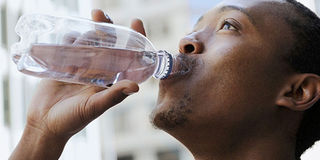Water is essential for a healthy lifestyle

A child up to three years may take up to four glasses of water, four to eight years, five glasses, and nine to 13 years up to eight glasses and adults up to 10 glasses of water per day. PHOTO by Edgar Batte
What you need to know:
Water is life and even more so for people with sickle cell. Drinking adequate amount of water daily should be a habit. But like all habits, it has to be developed, most times, deliberately.
According to www.sickle-thal.nwlh.nhs.uk, an insufficient amount of water in the body (dehydration) is one of the most common causes of a sickle cell crisis.
In this situation the blood becomes thicker and sickled shaped red blood cells are more likely to stick together and cause a blockage in blood circulation.
For this reason, sicklers are encouraged to make drinking water a lifestyle.
At this year’s conference for sickle cell awareness that took place on September 19, emphasis was on hydration.
Why water?
U.S. Air Force Maj Lukiah Mulumba Lukia of the Uganda-America Sickle Cell Rescue Fund says without water, one is at a risks dehydration which could then set off an alarm.
“Water is vital for the movement of the red blood cells. Since the disease already damages the cells and it’s no longer doughnut shaped (as normal) but sickle shaped, it is hard for them to move properly in the blood vessels. Water helps them move normally and also helps in the even distribution of oxygen. This then also prevents the blood from clogging the veins that lead to blood clotting and other complications associated with the sickle cell disease,” says Evelyn Mwesigwa, a social worker and chief executive officer of Uganda Sickle Cell Network.
www.froedtert.com/sickle-cell-disease/staying-healthy/water explains that sickle cell disease damages the kidneys causing them to produce more urine than usual. Frequent urination leads to dehydration hence the need to hydrate.
“Every time someone uses the bathroom, they lose water and therefore need to replace the lost fluids by taking more water. This will also help clean and flash out all the toxic substances from the body (when there is enough water in the body”, Mulumba says.
“Many a time we get days when we get to eat lots of food than usual. Without water though, there will be a very big problem with the ingestion and digestion of the food eaten. Water helps the food to be taken properly to the rightful destinations in the body.” she said.
Quantity
Mulumba advises that even if water has been recommended to be taken, one should not overdo it.
“That would cause over hydration. Too much of anything is always bad. Be careful of what you read on the Internet.
A child up to three years may take up to four glasses of water, four to eight years, five glasses, and nine to 13 years up to eight glasses and adults up to 10 glasses of water per day.
Drinks to avoid
Lastly, excessive drinking of alcohol, strong coffee or even energy drinks as these keep retracting water from your body.
About sickle cell
To understand what sickle cell disease is, you need to first understand a little about blood. Blood contains red blood cells (RBC) that transport oxygen around the body. The substance that carries the oxygen in the red blood cells is called haemoglobin. When someone has sickle cell, the haemoglobin becomes an abnormal shape, distorting the shape of the red blood cell — it becomes sickle-shaped, the shape of the letter “C”.
So unlike normal red blood cells, which travel easily through small blood vessels, sickle cells are stiff and pointy, making them likely to get stuck and block the flow of blood. Not only can this cause episodes of pain (known as “crises”) which often require hospitalisation, but the lack of oxygen can lead to organ damage too.
Furthermore, since sickle cells have a shorter-than-normal life span, the person develops anaemia (low RBC count). Whereas a normal red blood cell lives for about 120 days in circulation, a sickle cell lives for only 10 to 20 days.
Most people forget about the importance of water, but adequate hydration means that the patient will not require hospitalisation to get intravenous fluids.
Adapted from Daily Nation




